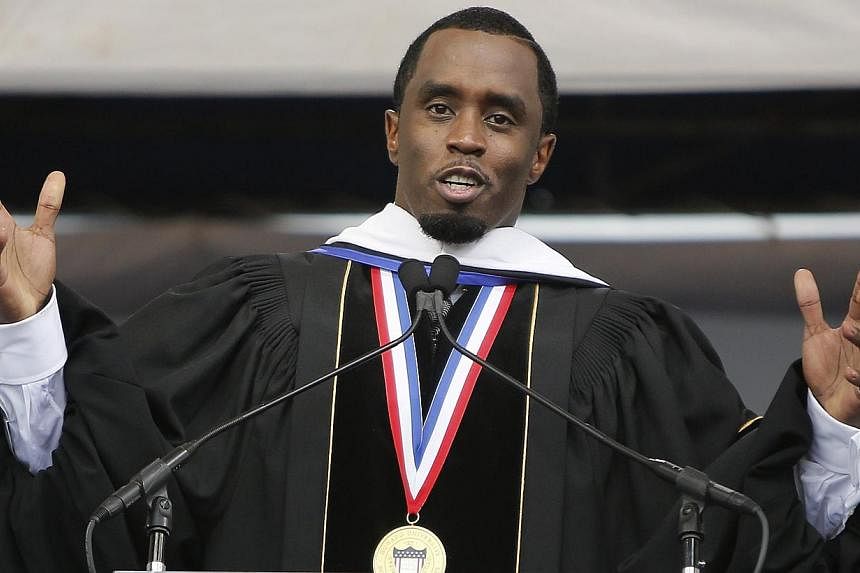WASHINGTON (AFP) - At Howard University's graduation ceremony, students got advice from a guest speaker unlike most given that honor: Sean Combs, or "P. Diddy", a leading symbol of hip-hop artists turned businessmen.
Facing a sea of young people wearing blue gowns, the magnate of rap spoke Saturday of the secret of his success.
"I decided to embrace the entrepreneur spirit of my dad but in a honest way, in a legal way," said Combs, whose father died in a drug deal gone wrong.
Sitting atop a personal fortune of 700 million (S$875 million) dollars, "P. Diddy" is among a coterie of rapper businessmen who have gone from inner city streets to the pages of the Wall Street Journal.
The king of West Coast rap, Dr. Dre, could soon become hip-hop's first billionaire, if a proposed sale of his headphone and music streaming company Beats to Apple goes through.
"It's a great landmark. After all, it's a deal with, by some measures, the greatest company in the world," said Dan Charnas, author of the book "The Big Payback. The History of the Business of Hip-Hop".
"But that would also make sense in the context of the rise of the hip-hop entrepreneurs," Charnas added, referring to the long years hip hop has spent knocking on the doors of US capitalism.
A deal reached nearly 30 years ago between the now legendary record label Def Jam and music giant Columbia paved the way.
But it did not immediately erase the wariness of the establishment toward this African-American urban culture.
It took until the mid 2000s to see the kings of hip-hop sign lucrative deals turning their personal brands into very big money.
"Why would the mainstream understand rock'n'roll so easily but then hip hop has to wait to have billion dollar deals" asked Steve Stoute, a former record label executive who founded the marketing company "Translation".
In a sign of the changing times the magazine Forbes now publishes a wealth ranking specifically for the fortunes of hip-hop artists, which do not stem only from music.
The richest of all of them is P. Diddy, who founded his own record label, Bad Boy Records, but also established a line of clothing (Sean John), signed a partnership with the vodka brand Ciroc and launched a music channel, Revolt TV.
Following the success of his album "Get Rich or Die Tryin'" rapper 50 Cent made a bundle by investing in Vitaminwater, which was bought out by Coca-Cola in 2007 for 4.1 billion dollars.
The seasoned businessman Jay-Z has also built an empire, including a clothing line and a stake in an NBA basketball team.
But he says having an entrepreneurial spirit was more a necessity than a choice for hip-hop performers.
"We went to every single label and every label shut their door on us. The genius thing that we did was that we didn't give up," he said in March 2013 at an event with investment guru Warren Buffett.
"We started selling our own CD, we built our own buzz and the record companies got back to us."
Faced with plummeting revenues, the recording industry was no longer in a position to snub a commercial tidal wave.
"I think that the best thing that happened to hip hop was teenagers having posters of these artists on their wall. They wanted to dress like these guys, singing the song in the house. It forced everybody to pay attention," said Stoute, who produced an album for Eminem.
As a big money heavy weight, the business of hip hop has set aside the angry social claims of pioneers like Public Enemy.
"Hip hop long ago made peace with commercialism. In America, political hip hop is nowhere," said Charnas.

